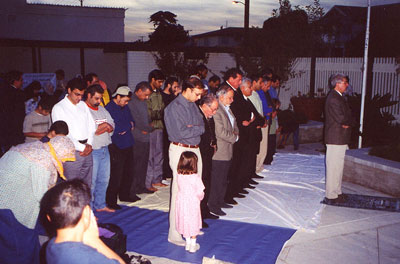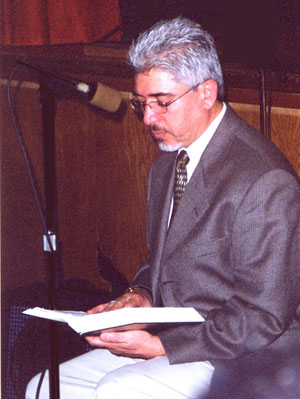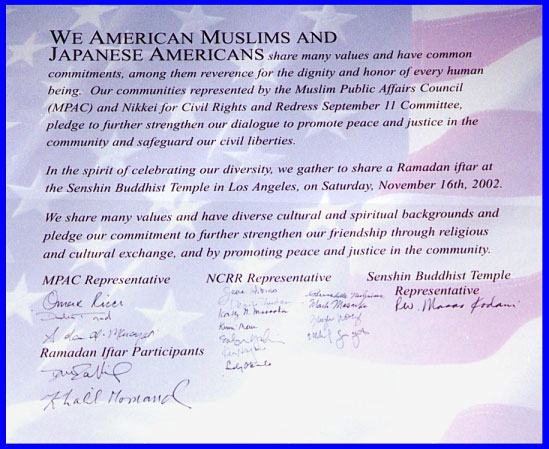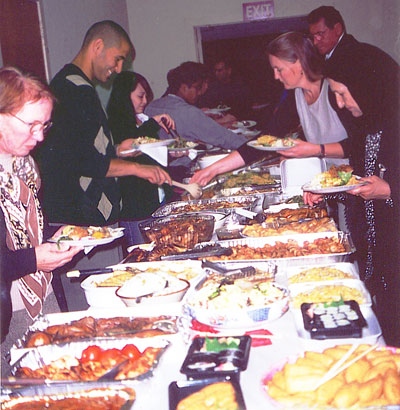 Home | Who We Are | Past Events | Open Forum | Campaign for Justice | Contact Info | Membership | Links | Search |
||||
 Home | Who We Are | Past Events | Open Forum | Campaign for Justice | Contact Info | Membership | Links | Search |
||||
|
““Breaking the Fast” event held A Cultural Exchange between the Muslim American Community and Japanese American Community
During the holy month of Ramadan, Muslims take no food and water during daylight hours, breaking the fast only when the sun goes down. MPAC and members of the Muslim community broke their fast, held their evening prayers and shared their Muslim traditions with our community at the Buddhist temple. Reverend Masao Kodani of Senshin Buddhist Temple explained Buddhist tradition and rituals. A potluck dinner followed with informal discussions of the Muslim American and Japanese American community. Participants at the “Breaking of the Fast ” event brought food to share with all. The event began with an explanation of the fast and Ramadan. Reverend Masai Kodani of Shenshin Buddhist temple, explained buddhist traditions, and how Buddhists, like Muslims today, were suspect after Pearl Harbor. He explaned some of the differences between the Buddhist and Muslim religions. One similarity he noted was that both communities love to eat good food. Hedab El Tarifi of MPAC shared Muslim traditions with our community and information about some continuing MPAC Activities, including the upcoming Annual Convention.
a resolution was signed to dedicate efforts to promote peace and justice in the community and to protect civil liberties of all. The resolution read the following: We American Muslims and Japanese Americans share many values and have common commitments, among them reverence for the dignity and honor of every human being. Our communities represented by the Muslim Public Affairs Council (MPAC) and Nikkei for Civil Rights and Redress September 11 Committee, pledge to further strengthen our dialogue to promote peace and justice in the community and safeguard our civil liberties. In the spirit of celebrating our diversity, we gather to share a Ramadan iftar at the Senshin Buddhist Temple in Los Angeles, on Saturday, November 16th, 2002. We share many values and have diverse cultural and spiritual backgrounds and pledge our commitment to further strengthen our friendship through religious and cultural exchange, and by promoting peace and justice in the community. Representatives from MPAC, NCRR, Senshin Buddhist Temple, Masjid Omar Ibn AlKhatab, Islamic Center of South Bay, Islamic Center of Southern California and Masjid Ibadillah signed the resolution. Entertainment followed including singing by the Pasadena New Horizon school, Performing Arts Club, directed by Lois Tucker, and a taiko performance by Johnny Mori and George Abe. This year’s Break the Fast event followed a similar program last year, which had come in response to the attacks in New York and Washington. In September last year, 300 people gathered at a candlelight vigil in Little Tokyo to express support for the victims of September 11, to speak out against the scapegoating of Arabs and Muslims and to oppose terrorism.. Several organizations that sponsored the vigil, and many individuals expressed the desire to continue to give support and learn more. The NCRR September 11th committee was formed to help plan events that build understanding between the Japanese American-Asian American community and the Arab American and American Muslim communities.
This year’s Break the Fast event brought together members of the two communities to continue the on-going relationship them. The NCRR 9/11 Committee plans to continue to deepen its relationships with MPAC,ADC,CAIR and SAN through future events The committee is open to helping with speakers and educationals. For information,call NCRR at 213-680-3484, or log on to www.ncrr-la.org Some things people can do:
2) Log on to the websites of these organizations 3) Write / e-mail your congressperson-communication through the internet has become a powerful tool. The Muslim Public Affairs Council (MPAC) is a public service agency working for the civil rights of American Muslims, for the integration of Islam into American pluralism, and for a positive, constructive relationship between American Muslims and their representatives. MPAC was founded in 1988 as a non-profit social welfare organization. For more information, see their website at www.mpac.org Nikkei for Civil Rights and Redress (NCRR - formerly known as the National Coalition for Redress/Reparations) was founded in 1980 by Japanese Americans from across the country who held the firm belief that our community had to come together to fight for proper redress for what our government did during World War Two. NCRR is active in the civil rights, peace and justice movements in the Japanese American community.
|



